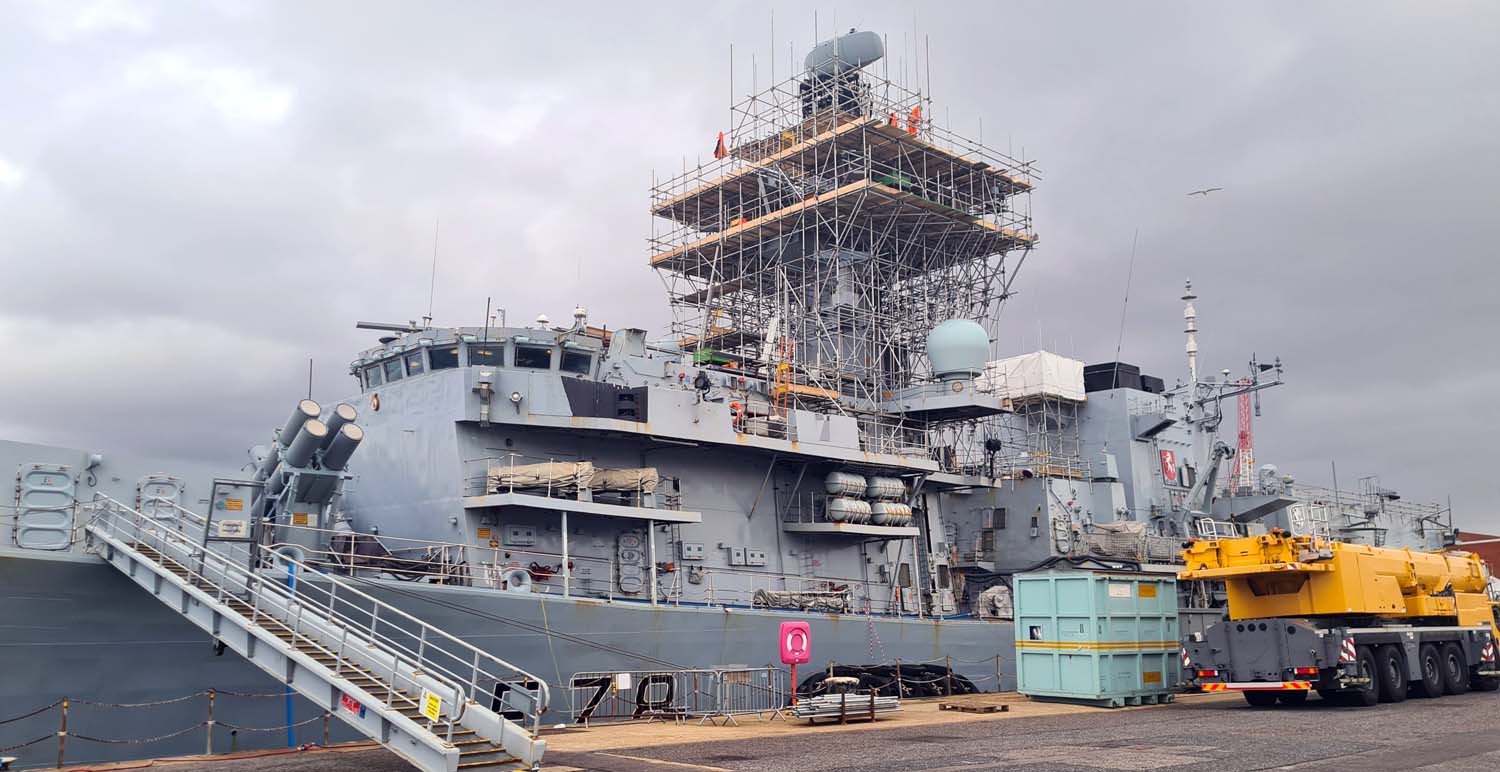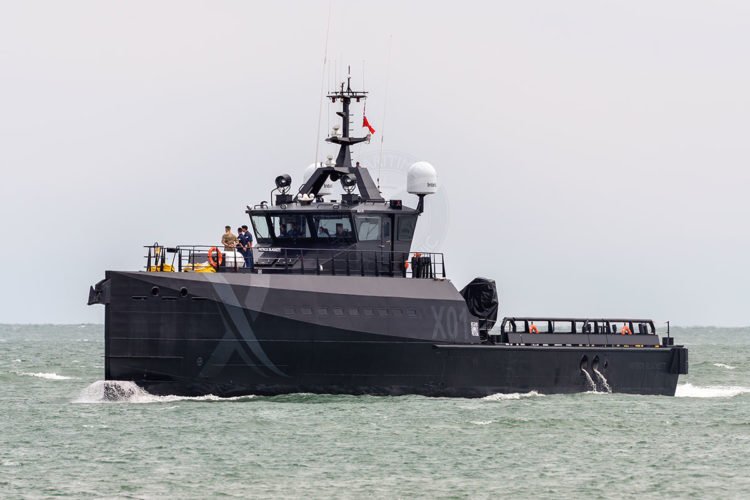Last Friday, the British Royal Navy unveiled its latest testbed vessel, built by Damen Shipyards. This is the first time a Dutch defense shipbuilding company has supplied a vessel directly to the Royal Navy, less than a year after the order was placed.
The 270-ton ship arrived at the Portsmouth naval base in southern England ahead of its official welcome. It will be used by NavyX, an autonomy and lethality accelerator that brings together Britain’s military, scientists, industry, and engineers to work on innovative and advanced technologies.
The experimental vessel (XV) is a modified version of the 42-meter crew-supply platform—Damen FCS 4008—that enables the autonomy accelerator to experiment without putting “the service’s understrength surface warship fleet” under too much pressure.
The ship, named after British physicist and Nobel Prize awardee Patrick Blackett, will join the Royal Navy and NATO exercises “with the possible upgrades to autonomous technology,” the British Defense Ministry stated.
Introducing the new @RNNavyX Experimental Vessel ‘Patrick Blackett’ at #Portsmouth. The vessel is named after Lord Blackett, former RN sailor and Nobel Prize winner in Physics. pic.twitter.com/23ovHxVsi7
— Gary Davies (@MaritimePhotos) July 27, 2022
Navy chief Colonel Tom Ryall proclaimed that the arrival of XV Patrick Blackett would be critical in increasing the agency’s “ability to deliver” cutting-edge output and mark a significant milestone for the Royal Navy.
Your #RoyalNavy news update.
This week’s episode comes from our new experimental vessel that will keep us at the cutting edge of tech, while we have news of @HMSPortland tracking Russian submarines and @ExeterChiefs training with the @RoyalMarines.
🔗https://t.co/6jg0BUEnFu pic.twitter.com/2Lkli12McV
— Royal Navy (@RoyalNavy) August 2, 2022
“She will give us greater flexibility to experiment with novel military capabilities, iterate, and accelerate new technology, kit, and concepts for the benefit of the Royal Navy and industry,” he added.
FCS 4008 has a “large, unobstructed area for unmanned aerial vehicles (UAVs),” autonomous underwater vessels (AUVs), and other cutting-edge technology, according to Damen shipyard. It added that “the extensive internal area of the platform that would normally have seating for up to 100 personnel will be converted into an operations center and a meeting room.”
Royal Navy’s next-generation
Britain has also been investing in expansion, especially in its manned and unmanned maritime vessels like the United States.
Since 2013, the UK Ministry of Defense has published its yearly Equipment Plan, which outlines its intention to increase investments in equipment procurement and support innovative projects over the next ten years, with an estimated spend of £238 billion ($289 billion). Within those figures, up to £38.1 billion ($46 billion) will go to the navy to improve “the sustainability, lethality, and availability of the fleet,” as well as to boost future generations by “delivering a more modern, high-tech, and automated” navy.
The future of Royal Navy aviation is looking to transform following the signing of a £60m contract for an unmanned helicopter. Leonardo will design and develop a three-tonne demonstrator, which could provide an innovative alternative to existing aircraft.https://t.co/o6NWKkUX1n pic.twitter.com/1Bbgh9NTku
— Royal Navy (@RoyalNavy) July 21, 2022
Furthermore, the fleet’s lethality will be ramped up by upgrading the air defense capability, Sea Viper, on Type 45 destroyers by the summer of 2026.
In contrast, the US Navy has requested Congress for a $27.9 billion budget for its shipbuilding projects for the fiscal year 2023 to expand its future fleet of manned and unmanned ships. Nevertheless, similar to its counterpart, most British investment will go into shipbuilding as part of a strategic and long-term investment that will increase the capability and size of the Royal Navy’s surface fleet while also allowing for the development of new vessels.
If all goes to plan, by 2028, the Royal Navy will receive its three new classes of vessels: Type 26 frigates, Type 31 frigates, and Fleet Solid Support ships.
Aside from the new platforms, it will also be used to reprofile Type 26 and Type 23 refits and to develop new lightweight torpedoes for ships and aircraft to replace existing Stringray weapons. They will also prioritize procuring “a high-capability ship-to-ship missile to replace the current Harpoon missile system,” which will be decommissioned next year.
UK’s shipbuilding vision
The UK government announced earlier this year the revitalization of its shipbuilding industry through an overhaul update of its National Shipbuilding Strategy, which was first published in 2017. The outline included plans to transform naval procurement and secure, sophisticated export and design contracts for British naval ships. This will improve the Royal Navy’s capability and level the shipbuilding industry’s productivity and livelihood opportunities.
Consequently, the government will set aside over £4 billion ($4.9 billion) to support shipyards and suppliers across the country.
Prime Minister Boris Johnson has stressed the importance of shipbuilding as part of the country’s history for centuries.
“Shipbuilding has been in our blood for centuries and I want to ensure it remains at the heart of British industry for generations to come.”
He added: “The National Shipbuilding Strategy will transform this important and crucial industry, driving technology development and upskilling the shipbuilders of tomorrow. This will ensure the UK is rightly seen as a shipbuilding power across the world.”

“Our refreshed strategy will see the sector galvanized at a crucial time for our economy and see a vital part of British industry expand and flourish,” said Defence Secretary and Shipbuilding Tsar Ben Wallace.
Among the many other investments include £206 million ($250 million) for the UK Shipping Office for Reducing Emissions (SHORE), £11 million ($13.4 million) for the Maritime Capability Campaign Office (MCCO), and an initial £2 million ($2.43 million) for the Home Shipbuilding Credit Guarantee Scheme (HSCGS).










COMMENTS